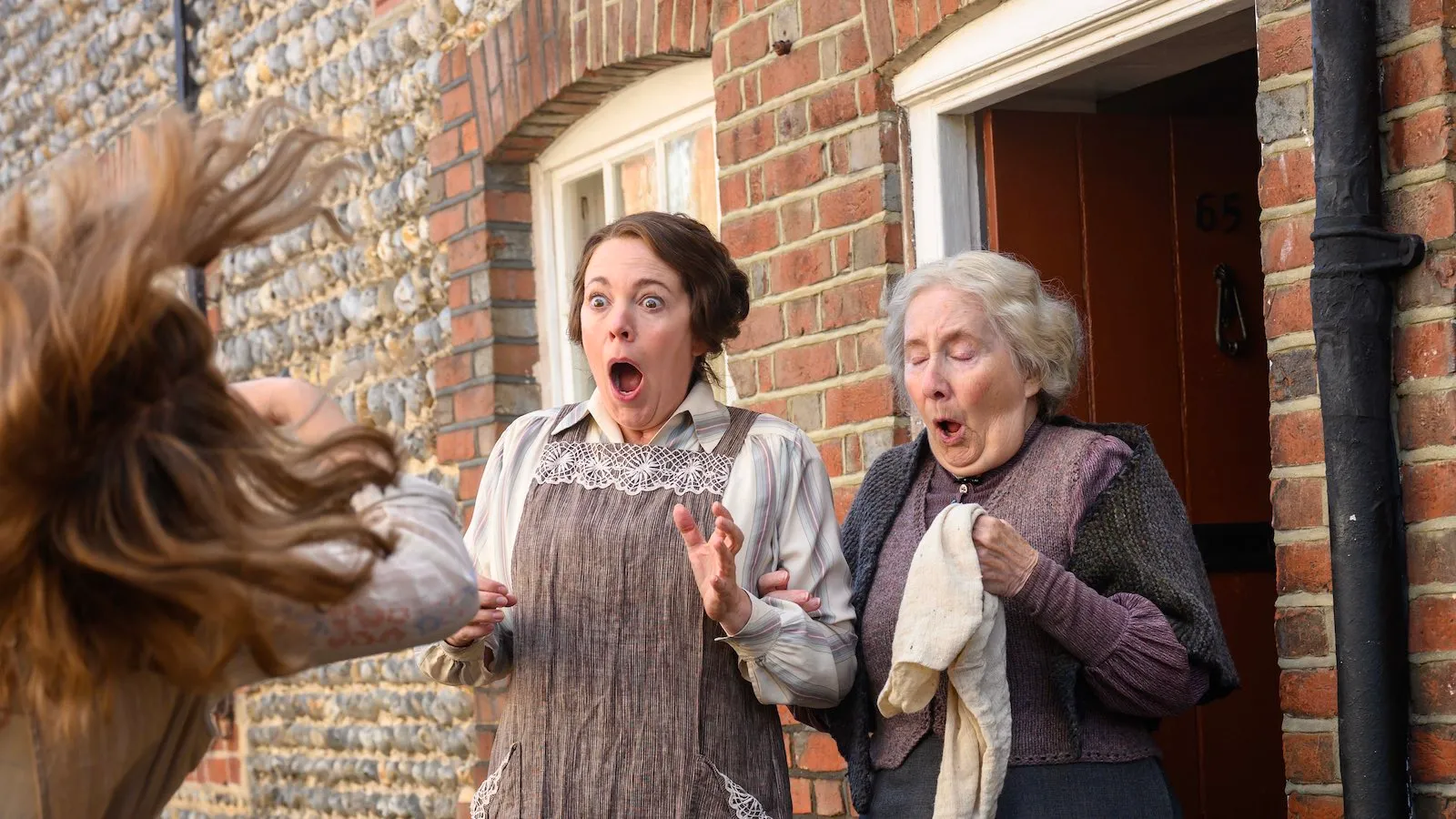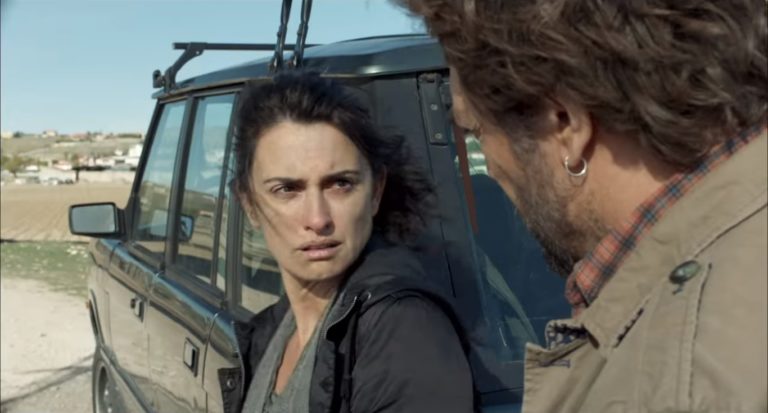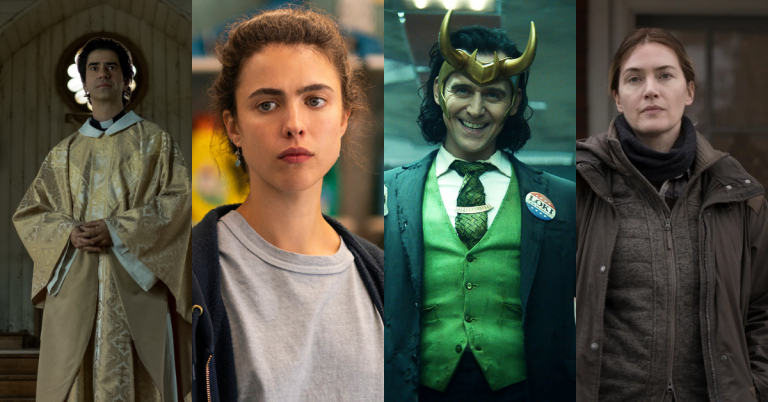Thea Sahrrock’s “Wicked Little Letters” is shockingly inoffensive for a film centered around a series of outrageously insulting letters. Tame and conspicuous in delivery, it may open with an intriguing assertion, promising a story that is “more true than you’d think,” yet arrives as a predictable, tonally imbalanced, and shallow retelling. Oscar-winner Olivia Colman reverts to her comedic roots as Edith Swan, a devoutly Christian woman, who is barraged with this slanderous series of letters.
Whilst initially, her earnest readings of their sexually explicit, expletive-filled contents are humorous, they lose their shock value, the comedy quickly becoming tiresome and stale. Meanwhile, Jessie Buckley co-stars as Rose Gooding, a vivacious young mother and the presumed sender of the letters. She provides an excellent counter-point to Colman’s Swan. She is liberated, fun-loving, and audacious enough to match Swan’s innocent and timid persona. But as a character, she is unfortunately stuck as a messenger of under-cooked and obvious ideas rather than a fully developed person in her own right.
The period setting of 1920s England is well-realised. Littlehampton is suitably conveyed as a place in which gossip rules and the upholding of traditional “prim and proper” English standards is of the utmost importance. However, it makes little effort to truly absorb audiences into the setting, and the film offers broad, sweeping statements about the various social problems of this society rather than bringing anything unique to the table in terms of explorations of these ideas. Every point the film endeavors to make about the prevalent systematic sexism that existed comes across as hollow when filtered through the lens of such an overtly cartoonish story. “Wicked Little Letters” often feels out of sync with itself, self-congratulatory whilst making simplistic comments, and too silly for any of the emotional weight to really land with the intended effect.
The film portrays itself as a mystery. Uncovering who sent the letters is the driving force of the narrative. Yet the answers it provides are so predictable that it is nearly impossible to develop any engagement. As a spectator, you never yearn to learn the truth and are never given the opportunity to solve it for yourself. Instead, the plot reveals itself in a very matter-of-fact manner. At 100 minutes, the film ends up feeling bloated. Perhaps the concept could have made for a decent sketch or short film. Still, as a feature, it constantly positions the spectator with superior knowledge than the characters, and the movie ends up feeling a couple of steps behind you at all times, making for an unsatisfying watch.

“Wicked Little Letters” squanders the talents of a colorful ensemble, with performers given little material to work with as they are molded into one-dimensional caricatures. Anjana Vasan stars as PC Gladys Moss, who takes it upon herself to uncover the truth of this mystery whilst dealing with the exact kind of problems one would expect a female police officer to face in post-Victorian England. Vasan’s comedic capabilities are on display, but unfortunately, the character is designed solely to explore the aforementioned shallow social commentaries, so it is impossible to feel much pathos for her as a character.
Timothy Spall plays Edward Swan, the domineering patriarch of the Swan household, whose pantomime-esque presentation is in complete contradiction with the film’s portrayal of him as a menacing threat. With regards to this character, “Wicked Little Letters” suffers from the comedic constraints it locks itself in to provide any meaningful deconstruction of masculine power.
A final key fault of the film lies in its refusal to acknowledge the racism that existed in 1920s England, which is problematic given that, at its core, the film is about shifting societal attitudes. Casting people of color, such as Malachi Kirby, as Bill, Rose’s partner, and Anjana Vasan, without mentioning the potential backlash people of color would have faced at the time occupying these roles, feels willfully ignorant, especially when the film goes to great lengths to comment on the other societal issue of sexism. Color-blind casting as a concept can work, but not when the movie in question is one that endeavors to tackle serious societal issues. The concept of race isn’t brought up, and it ends up feeling like a huge missed opportunity to explore some genuinely interesting and thought-provoking ideas.
The fundamental problem is that it sacrifices a compelling plot or genuine character-based stakes in favor of juvenile, over-used comedic beats disguised as biting social satire. It comes across a little smug in parts, a cookie-cutter approach to first-wave feminism, without giving space for individualized spectator responses. Sweet’s script guides you throughout, telling you what to think about every single moment, never allowing for nuance or ambiguity. Overall, it’s a waste of a decent ensemble and an unfortunate misfire in most aspects.






![Movie Review: Laura Gets a Cat [2018]](https://79468c92.delivery.rocketcdn.me/wp-content/uploads/2018/08/Laura-Gets-a-Cat-Film-Review-768x405.jpg)

